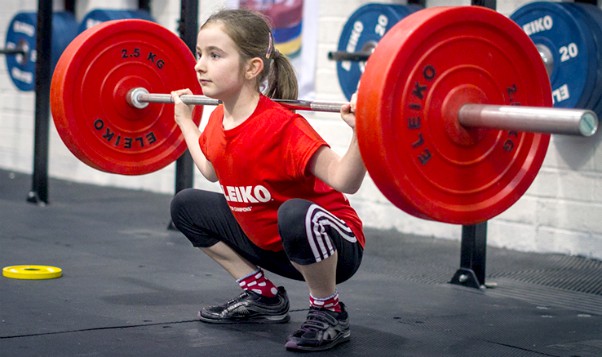One of the most controversial issues around weight training is what age should children start lifting. There are a lot of parents who are dead set against letting their children lift weights before they are well into their mid-teenage years or older.
If you were to post a picture of a child lifting weights on social media and you’d get all kinds of responses. Some will be positive and encouraging, but a lot of them will be very negative, some even down right nasty, and most of the negative comments will come from people who don’t have a clue what their talking about – but are convinced they are “right”.

You’ve probably heard myths and misconceptions like…
“Children can’t do weight training because they’ll get injured…”
“Weight training will cause premature closure of growth plates and stunt my child’s growth…”
“If children lift weights it will cause bone fractures and damage their joints…”
Ironically a lot of people who say things like this will have no problem putting their children in sports like baseball, soccer, hockey, football, basketball, karate, etc. And yet these sports have a much higher injury rate than lifting weights.
I was inspired to make this blog post after having a chat with one of my young followers, Harry, who is from Australia. He’s working on a research project for school and wanted to get my opinion about weight training and how it can impact the growth and development of male adolescents.
Below is an overview of the Q and A from our chat, I wanted to share this here as a blog post for the benefit of all my online followers.
Note: Even though most of Harry’s questions are geared towards lifting weights for young males, a lot of the same advice would apply to young female lifters as well.
Enjoy!
Q: At what age did you begin to lift weights?
A: I started lifting weights at 12 years old, but I was a physically active person before that with soccer, martial arts, and bmx biking.
Q: At what age do you recommend people start weight training?
A: To maximize one’s health, strength, and physical development I’d recommend starting with something like gymnastics as young as 2 or 3 years old. This will help children to develop their neuromuscular skills, strength, balance, coordination, etc. My son is almost 2 years old and we’re looking into getting him involved with gymnastics. At first it will be just playing on the mats and interacting with the other kids, but it will progress as they grow, and help teach children about fitness from a young age.
As for actual “weight training”, if someone is old enough to participate in organized sports, then they are old enough to start weight training. However, I think the ideal time would be at the start of puberty, usually between 10-13 years old for most kids. You can make a lot of muscle and strength gains if you lift weights as your body starts changing and producing more natural anabolic hormones.
Q: What benefits are there for 14/15 year old males involved in weight training?
A: There are a lot of benefits… Besides the obvious ones of building muscle, increasing strength, and improving sports performance. Weight training will also help with improving self confidence, improving self discipline, better mental focus, improved brain function (i.e. lifting weights can make you smarter) and it helps with losing bodyfat which can prevent obesity and all the health risks that are associated with being overweight and out of shape.
Q: What negative effects can weight training have on a young male?
A: If a healthy young male is properly trained by an experienced coach who is looking out for his overall health and well being – and not simply trying to win a championship or push him to be the best – then I don’t believe there are any real negative side effects.
When it comes to the horror stories that you hear about teens lifting weights, such as; damaging bones or joints, growth plate closure, causing physical injury, or body dysmorphia, etc. Most of them are blown out of proportion or just myths. One of the biggest misconceptions is that weight lifting will stunt your growth. There has never been a single study that has shown lifting weights will inhibit a child’s growth.
Any serious injuries or negative side effects from lifting weights usually come from poor program planning, poor coaching, having unrealistic expectations, and pushing people to lift beyond their means, or not restraining them from doing too much on their own.
However, if a young male is coached properly from the start, learns proper lifting technique, lifts within his means, allows adequate time between workouts for rest and recovery, and progresses at a gradual pace. He can safely lift weights and reap the health benefits without any serious negative downsides.
Q: How often should a young male train?
A: That’s going to depend on his individual fitness level. Someone who has been active his whole life and is in really good shape will be able to handle a higher volume of training compared to an overweight out of shape beginner who is just getting started. You really can’t design weight training programs based on age alone, you need to factor in their fitness level. But a good general rule of thumb that will work for “most people” is to lift weights every other day (i.e. 1 day on and 1 day off). By doing this you’ll allow time for the body to rest, recover, and grow in between workout sessions.
Q: How long should their training sessions be?
A: Again, that’s going to depend on an individual’s fitness level. You can’t design a workout program based on age alone. You could have a group of people who are the same age, but that doesn’t mean they will all be in the same physical shape or have the same level of work capacity. This applies to people of all ages, not just teenagers.
But again a good general guideline is to keep weight training workouts to no more than 1 hour, every other day. This is a good starting point for most guys. Once they have been doing this consistently you can always adjust the training volume up or down based on how their body responds to the workouts.
Q: What advice would you give a 15-year-old boy wanting to begin weight training?
A: Work with an experienced weight training coach who can teach you the fundamentals, track your progress, and adjust your workouts according to your individual progress. While there are a lot of positive benefits to weight training, it can be dangerous if left unsupervised or done carelessly.
It’s almost like teaching a teenager how to drive a car, you would never just hand them the keys and tell them to go figure it out on their own. That would be crazy. They need proper coaching to learn how to drive a car and stay safe. And they also need proper coaching to learn how to lift weights and stay safe.
Q: Are you aware of any injuries, which occur due to weight lifting at a young age?
A: The most common weight training injuries come from trying to lift too much, too soon, and not respecting the limits of your body. They generally involve pulling or straining a muscle, joint, tendon or ligament. In some extreme cases it could be an actual muscle or tendon tear requiring surgery, but that’s quite rare for young lifters. Serious injuries like that usually only happen to older more experienced lifters – often competitive lifters – who are constantly pushing the limits of what their body can do. Very often exceeding those limits and sometimes get injured because of it.
Q: In general, do you believe strength training can be more harmful or more beneficial to a teenage boy?
A: The benefits of developing healthy lifestyle habits from a young age through proper physical fitness (which includes weight training) far outweigh the potential risk of getting a workout injury. And even if you do suffer in injury in the gym, more often than not it will heal up normally without any long term consequences.
I’m very thankful that I started weight training from a young age. Developing the habits of health and fitness has been one of the best things I’ve done in my life. I couldn’t imagine my life without weight training.
Q: How would you describe the safety aspect of weight training?
A: Weight training is a lot safer than most people realize. The thing about weight training is once you know what to do and how to do it, you are in total control. As long as you lift within your means, the risk of injury is very low. You’re not at the mercy of outside forces like you are in many other situations.
For example; when it comes to playing team sports, you can be a good sportsman and play safe, but there are other players on the field who could potentially injure you. However, when it comes to lifting weights – it’s just you and the weights, you are in total control over what you do, not anyone else. So from that aspect alone it’s one of the safest sports you can do.
Q: What is your motivation to lift weights?
A: My father had a huge influence on me because he worked out and kept active, and he still does to this day. Throughout my entire childhood I would watch my dad lift weights, go for runs, go for bicycle rides, etc. and I wanted to be like my dad 🙂
My passion to develop my body grew as I went through grade school because like a lot of kids I got picked on and bullied at school. This negatively affected my self esteem and confidence. So I thought that if I could build muscle, get bigger, and stronger then no one would ever bully me again. That’s what lead me to lifting weights and joining martial arts.
As I started to grow and develop my body I became more interested in the sport of bodybuilding. I’ve competed in bodybuilding competitions at the local and regional level from 1995 through 2011. During this time my main motivation was to improve myself as a bodybuilding competitor.
Now my main focus is to train for the way it makes me feel. It’s like a healthy addiction. When I workout regularly I feel better, I look better, and I get the rush of natural endorphins that come from physical exercise. It just makes me feel good to workout and lift weights. When life gets busy and I sometimes slack off with my workouts, I really miss that feeling, and that’s what draws me back into the gym again and again.
Another major motivating factor is I want to be a positive role model for my son, just like my dad was to me.
Q: Have you ever experienced any injuries from training?
A: Yes, I’ve pulled muscles, strained joints, tendons, and ligaments from pushing myself too hard during my days as a competitive bodybuilder. Mostly during the time between 2008 and 2010 when I was at my competitive peak. But now I’m much more respectful of my body. I no longer try to push beyond my limits like I often did when I was obsessed about competition. Since I’ve learned my limits and respect my body more, I’ve never suffered an injury from weight training.
Q: If you have any other relevant information, please add it here:
A: You can read a full summary about how I got started with bodybuilding and progressed over the years on my website at: https://leehayward.com/blog/about
You can quote any of that information as you see fit for your project. And if you have any other questions or need clarification on anything we covered here, just let me know and I’ll do my best to help you out.
Q: Thanks so much Lee, this will be highly useful for my research project, cheers!
That’s an overview of our chat about weight training for teenagers. If you have any questions, comments, or feedback about the information covered here – please post them in the comments section below.
You can also refer to the references listed below for scientific studies about the safety and health benefits of weight training for young people…
References:
https://www.researchgate.net/publication/256929167_Position_statement_on_youth_resistance_training_The_2014_International_Consensus
https://www.ncbi.nlm.nih.gov/pubmed/26089321
https://www.ncbi.nlm.nih.gov/pubmed/25968858
https://www.ncbi.nlm.nih.gov/pubmed/28447880
https://www.ncbi.nlm.nih.gov/pubmed/24121247
https://www.ncbi.nlm.nih.gov/pubmed/28795003
https://www.ncbi.nlm.nih.gov/pmc/articles/PMC3483033
https://www.ncbi.nlm.nih.gov/pmc/articles/PMC4034275









6 Comments
leehayward
What age did you begin lifting weights?
Please let me know in the comments section below…
Iwo
I started lifting at 15(still am)and iv been doing it for about 5 months now,and i have experienced no negative side effects from both supplements and lifting
leehayward
Iwo,
Glad to hear you’ve been working out consistently for the past 5 months. That’s really good. Keep it up!
John
Hi Lee, I still believe lifting weights will stop your growth. I believe you started very young and thats why you stopped growing and are just 5’6″.
I started around 13 and that’s when I stopped growing. Am only 5’7″
All my friends are taller. Lets not misguide youngsters.
leehayward
John,
Yes it’s true that I’m only 5’6 tall. But my father is the same height as me, my mother is 5’3. And everyone in my family going back to my grandparents, aunts, uncles, etc. is short, it’s our genetics.
By that same token, Lou Ferrigno (the incredible hulk) started lifting weights at 13 years old and grew to be 6’5 tall. If lifting weights stunts your growth, than Lou should be a short man as well.
To learn the truth about this, I recommend that you read the “Position statement on youth resistance training: The 2014 International Consensus” at: https://www.researchgate.net/publication/256929167_Position_statement_on_youth_resistance_training_The_2014_International_Consensus
If you don’t want to read the full report, just skip to the section called “Resistance training and the growing skeleton”.
Sam
Hey Lee great article,
I started training with weights at 24 years old.
I don’t believe children should do any weight training apart from bodyweight training. I don’t think they’re mature enough both physically or mentally.